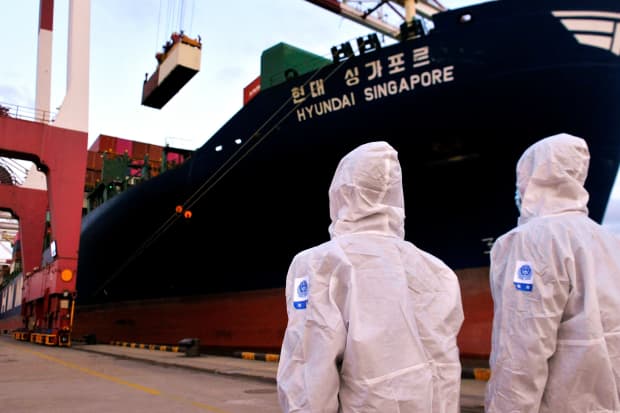This post was originally published on this site

Chinese immigration inspection officers in protective suits watch November work underway at a cargo ship at the port in Qingdao, in China’s eastern Shandong Province.
str/Agence France-Presse/Getty Images
BEIJING — China’s November exports hit their highest monthly total ever, as the factory sector thrives amid ongoing lockdowns in the West.
Shipments leaped 21.1% in November from a year earlier, nearly double October’s growth rate and far exceeding the 12% consensus forecast of economists polled by Bloomberg. The export of $268 billion in goods was China’s highest monthly total ever, and the fastest growth rate since February 2018, according to data from its National Bureau of Statistics.
The sixth straight month of robust exports came alongside softening import growth, putting China’s overall trade surplus at $75 billion in November, up from October’s $58 billion.
See: Asian markets pull back on report that U.S. may sanction Chinese officials
The imbalance was felt especially in the U.S., which imported $52 billion in Chinese goods last month, a near 50% increase from the same period last year. This raised America’s trade deficit with China to the highest level of Donald Trump’s presidency.
From the archives (June 2020): Bolton book adds urgency to Trump bid to depict himself as a China hawk and to paint Biden as a Beijing apologist
“The November foreign trade figures are in line with a continued rebounding trend seen since summer, as China’s major trading partners, from Asian countries and the EU to the U.S., have posted better-than-expected readings in economic growth,” Chen Fengying, a research fellow at the China Institutes of Contemporary International Relations, told the media Monday.
Certain export sectors benefited more than others.
Foreign purchases of medical supplies from China rose as dozens of countries around the world remain mired in the coronavirus pandemic. Medical equipment shipments leaped 38% last month on a year-on-year basis. Exports of consumer electronics climbed 25% to $166 billion.
From January to November, exports of textiles — which include most types of face masks — totaled $151 billion, a 33% increase over the same period last year.
Christmas and other Western holiday-related items also account for an outsized share of November’s growth, NBS data showed.
Meanwhile, China’s November import growth softened to 4.5% year-on-year, a weakening from the previous month and missing significantly the 7% expectation from the Bloomberg survey.
Not all experts were upbeat about China’s broader economic outlook.
“November’s trade data continues to show just how lopsided China’s economic recovery has been, with almost all of the recovery on the supply side rather than the demand side,” Michael Pettis, a professor of finance at Peking University and a senior fellow at the Carnegie-Tsinghua Center for Global Policy, told MarketWatch.
“With export revenues up 14.9% in RMB (21.1% in dollars), we should have seen those revenues recycled through wages and consumption to show a sharp rise in imports, but imports in November were actually down from the previous November by 0.8% in RMB (up 4.5% in dollars). The result is China’s largest monthly trade surplus on record: $75.4 billion, or 6.0% of Chinese GDP. This is matched by a deficit with its trade partners of nearly 1.2% of the rest of the world’s GDP. Given how slow the recovery has been abroad, I am not sure the rest of the world will be eager to see so much of its domestic demand absorbed by China.”
Barron’s on MarketWatch: The renminbi will gain wider use globally, Gavekal’s CEO says
The widening of China’s surpluses globally with its key trading partners comes amid ongoing political tensions that are playing out largely in economic reprisals. Beijing has implemented tariffs or outright bans on Australian wine, barley, copper and a number of other goods as the two countries continue their diplomatic row.
China’s export boom was not enough to bolster local equities markets unnerved by a report that the U.S. is set to sanction even more Chinese officials over Beijing’s restricting of Hong Kong’s autonomy. The Hang Seng Index HSI, -1.23% had the worst day of any major Asian index, falling 2% at its intraday low, while the benchmark Shanghai Composite Index SHCOMP, -0.81% ended the day at 0.81%.
Tanner Brown covers China for Barron’s and MarketWatch.



